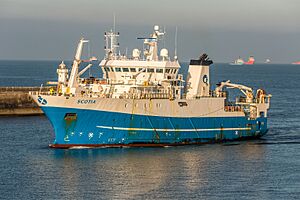Fisheries Research Services facts for kids
| Executive Agency overview | |
|---|---|
| Dissolved | 1 April 2009 |
| Superseding agency |
|
| Jurisdiction | Scotland |
| Headquarters | Aberdeen |
Fisheries Research Services (FRS) was a special group that worked for the Scottish Government. Think of it like a team of scientists. Their main job was to study and protect the fish and other sea life in Scotland. This included both saltwater (marine) and freshwater areas. They also looked after the places where fish are farmed, which is called aquaculture.
FRS had two main labs where their scientists worked. One lab focused on marine life, and the other on freshwater creatures. They also had two special ships that helped them do research out at sea. On April 1, 2009, FRS joined with other groups to become part of Marine Scotland. This new group is still part of the Scottish Government.
What FRS Did
FRS was like a science detective agency for Scotland's waters. They did important research to understand fish populations. This helped make sure there were enough fish for the future. They also studied how to protect the water and all the creatures living in it.
Studying Fish and Water
The scientists at FRS looked at many things. They studied different types of fish, like salmon and cod. They also researched how fish farming could be done safely. This meant making sure it didn't harm the environment. They worked to keep Scotland's rivers, lochs, and seas healthy for everyone.
Research Labs and Ships
FRS had a main lab in Aberdeen for studying the sea. They also had a lab in Pitlochry that focused on freshwater. These labs were full of special equipment. The two research ships, named FRV Scotia and FRV Alba-Na-Mara, were like floating labs. They allowed scientists to go out and collect samples directly from the ocean.
How FRS Was Funded
Most of the money for FRS came from the Scottish Government. This covered about 60% of their costs. The other 40% came from working on projects with other government groups in Europe. Sometimes, they also worked with private companies. This extra money helped them do even more important research.
See also
- Fishing in Scotland
 | Precious Adams |
 | Lauren Anderson |
 | Janet Collins |


